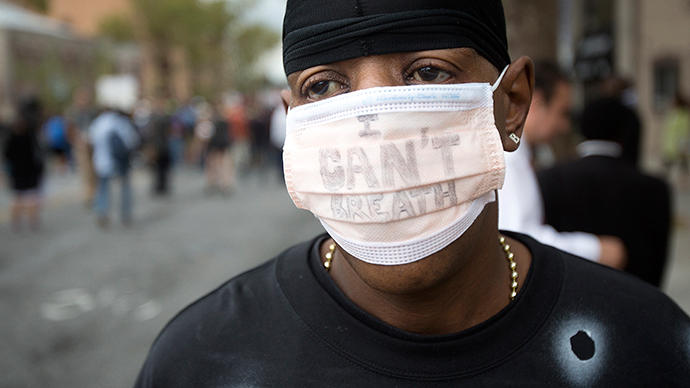CNN’s #ASKACOP Twitter campaign incites online fury

Whether by folly or design, CNN’s #ASKACOP social media campaign, which sought to create a dialogue between police and the public, has elicited a brutal backlash on Twitter.
The hashtag was intended to bring in viewer participation for a CNN program called “Cops Under Fire,” in which host Don Lemon fielded questions from a live studio audience and social media users.
READ MORE: #ICantBreathe: Thousands march against police brutality across US (PHOTOS, VIDEO)
If CNN was looking to generate a buzz, it succeeded wildly, though perhaps not in the way it had intended.
Y'all, please shut down #AskACop. Ask for facts and an explanation of why we're being executed by the police. pic.twitter.com/gygukiJXty
— deray mckesson (@deray) December 17, 2014
By the time the show aired Tuesday evening, #AskACop became one of the top-rated trends in the US. But just a cursory glance of the tweets shows any pacified conversation on police-public relations was off the table.
In tweets that were both sarcastic and indignant, the Twitterverse was flooded with variations on issues of police brutality.
#AskACop Will you be undergoing more training on how to murder innocent black people, I hear there are some still alive? @CNN
— Pukkah Punjabi (@PukkahPunjabi) December 16, 2014
Pop quiz: are these guns? #AskACoppic.twitter.com/WherY2PbHx
— Jane Belfry (@janemagnitude) December 17, 2014
#Askacop I have a math question: if 1 Black man has zero guns, zero knives and 2 hands, how many bullets does it take to disarm him?
— Jamilah Lemieux (@JamilahLemieux) December 17, 2014
Some examples forwarded pictures of people being kicked or choked by police, questioning why such excessive levels of violence were being used against people who were already restrained.
Did you ask this handcuffed lady if she wanted to taste your boot before inserting it in her mouth? #AskACoppic.twitter.com/lny9rTlWON
— Alisa M (@AlisasGotIt) December 17, 2014
Eric Garner, whose July death at the hands of New York police sparked a nationwide protest movement under the “I can’t breathe” slogan, came up prominently.
how is this NOT a chokehold? #AskACop@CNNpic.twitter.com/tgBSPRzT94
— Slim Thickens (@MissSneed) December 17, 2014
So did the broader issue of racism in policing. The number of instances where white mass murderers were brought in safely alive, whereas unarmed black men were shot dead, was one prominent theme. Others questioned why people would sign up to police black neighborhoods if they had an inherent fear of African Americans.
#AskACop why become a cop in a Black neighborhood if you're afraid of Black people? I'm afraid of ghosts, so you see me being a Ghostbuster?
— Jamilah Lemieux (@JamilahLemieux) December 17, 2014
White kids who shoot up schools and businesses don't scare you, just unarmed Black people right? #AskACop
— Taurean (@TheBlackVoice) December 17, 2014
How do you manage to bring in serial killers alive but you can never seem to help yourself with Black people? #AskACop
— CRACKA CHRIST (@DearLeader10) December 16, 2014
#AskACop Why do white adult men waving real guns at kids live, but 12-yr-old black boys playing with replicas don't? pic.twitter.com/H53L2SNDWU
— TheObamaDiary.com (@TheObamaDiary) December 17, 2014
“#AskACop why become a cop in a Black neighborhood if you're afraid of Black people? I'm afraid of ghosts, so you see me being a Ghostbuster?” Jamilah Lemieux wrote in a particularly biting message that was retweeted nearly 1,500 times.
Several cases in which handcuffed black men reportedly committed suicide while in police custody were forwarded to CNN for the panel’s consideration.
handcuffed w/ my hands behind my back how could I shoot myself in the chest&commit suicide? #VictorWhiteIII#AskACoppic.twitter.com/dXqwcWauWq
— GoddessAmaraDec8 (@ReeSieButtaCup) December 17, 2014
Care to explain how being shot in the back while handcuffed can be considered suicide? #AskACoppic.twitter.com/tYweNTD8De
— Glen Coco (@MrPooni) December 17, 2014
Broader trends of aggression prevalent among police officers in general also came up regularly, highlighting how some communities feel more threatened by police than protected.
Do you see how these threatening tweets from an @SanJosePD officer inspire community mistrust? #AskACop@CNNpic.twitter.com/vX2S2nS3eB
— sfpelosi (@sfpelosi) December 17, 2014
#AskACop Why do you have higher rate of domestic violence from male cops than male civilians yet you'll harm WoC and their abusers on calls?
— Trudy (@thetrudz) December 17, 2014
The level of public backlash on Twitter highlights social tensions fueled both by the Garner case and the August shooting death of Michael Brown. In both cases, grand juries opted not to indict officers on any charges, despite the fact that both men were unarmed when confronted by police
On Sunday, tens of thousands of people came out to protests across the US to protest the killing of unarmed black men by police.












